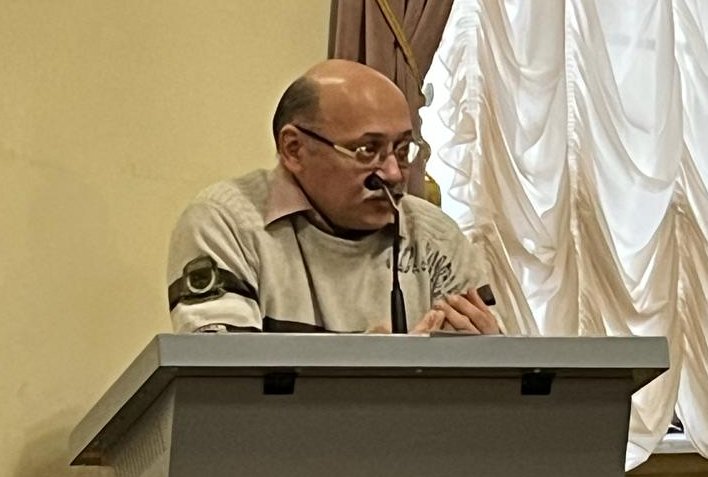March 14, 2023 Presentation by Corresponding member of RAS, Dr Sc. (History), prof. Dmitri Bondarenko within the framework of the scientific seminar "Culture and Society"
 On March 14, 2023, at noon, as part of the seminar "Culture and Society" of the Center for History and Cultural Anthropology, a presentation was made by Corresponding Member of RAS, Dr Sc. (History), Professor Dmitri Bondarenko, “The Anti-Racist Movement, the Memory of the Civil War, and the American Nation in the Second Half of the 2010s – Early 2020s: Based on Field Research”. The presentation was based on material collected over the years in twenty-eight cities and towns in fourteen US states and the metropolitan District of Columbia. The purpose of the presentation was to show how the historical (in other words, cultural or social) memory of the Civil War (war of the North and South) of 1861-1865 and the abolition of slavery associated with it manifests itself as a factor in the anti-racist movement, a new wave that has swept the country in recent years. Attention was drawn to changes in the memory of the Civil War associated with changing ideas about the history, essence, and socio-cultural boundaries of the American nation. The essence of these changes is the affirmation of the view of the American nation as including both whites and blacks on an equal footing. Behind this is a change in the perception of the Civil War as a key moment in the birth of the American nation: if earlier the war of the North and the South was seen as a war of white northerners and southerners, now the active role of black Americans in it is increasingly emphasized. At the same time, according to the speaker, the differences in the historical memory of the Civil War and the abolition of slavery, which persist in the North and South of the country, make it possible to substantiate the thesis that the sociocultural division of American society into northerners and southerners has not disappeared to this day, remaining one of the dividing lines in the American nation. The presentation also emphasized that not just racial dichotomy, but racial inequality was laid at the very foundation of American society during its formation. This fact raises the question of whether so-called systemic (otherwise, structural, institutional, or social) racism is eradicated in principle in the United States, despite the apparent improvement in the situation of the black community in the period after the victory of the Civil Rights Movement of 1954-1968.
On March 14, 2023, at noon, as part of the seminar "Culture and Society" of the Center for History and Cultural Anthropology, a presentation was made by Corresponding Member of RAS, Dr Sc. (History), Professor Dmitri Bondarenko, “The Anti-Racist Movement, the Memory of the Civil War, and the American Nation in the Second Half of the 2010s – Early 2020s: Based on Field Research”. The presentation was based on material collected over the years in twenty-eight cities and towns in fourteen US states and the metropolitan District of Columbia. The purpose of the presentation was to show how the historical (in other words, cultural or social) memory of the Civil War (war of the North and South) of 1861-1865 and the abolition of slavery associated with it manifests itself as a factor in the anti-racist movement, a new wave that has swept the country in recent years. Attention was drawn to changes in the memory of the Civil War associated with changing ideas about the history, essence, and socio-cultural boundaries of the American nation. The essence of these changes is the affirmation of the view of the American nation as including both whites and blacks on an equal footing. Behind this is a change in the perception of the Civil War as a key moment in the birth of the American nation: if earlier the war of the North and the South was seen as a war of white northerners and southerners, now the active role of black Americans in it is increasingly emphasized. At the same time, according to the speaker, the differences in the historical memory of the Civil War and the abolition of slavery, which persist in the North and South of the country, make it possible to substantiate the thesis that the sociocultural division of American society into northerners and southerners has not disappeared to this day, remaining one of the dividing lines in the American nation. The presentation also emphasized that not just racial dichotomy, but racial inequality was laid at the very foundation of American society during its formation. This fact raises the question of whether so-called systemic (otherwise, structural, institutional, or social) racism is eradicated in principle in the United States, despite the apparent improvement in the situation of the black community in the period after the victory of the Civil Rights Movement of 1954-1968.







